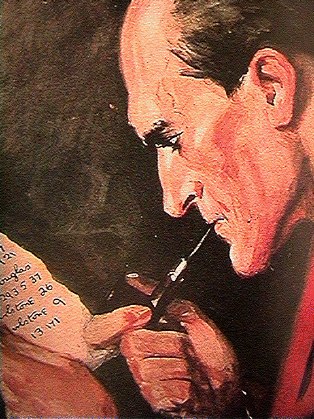Leadership Lessons from a Horse’s Mouth
Today’s guest post is from June Gunter, Ed. D. and CEO of TeachingHorse, LLC.
—————-
I am the Co-Founder and CEO of TeachingHorse, LLC. TeachingHorse provides leadership development and coaching through experiential learning with horses. Working with horses, people learn how to build trusting relationships, practice authenticity, and remain calm and confident in the face of uncertainty.
Several of my clients are on the path of becoming trusted advisors. Their work with horses has been a great way for them to practice developing intimacy and reducing their self-orientation.
Most of the clients I work with do not have issues with credibility or reliability. They are skilled experts with long track records of success – but they are staring squarely at a new reality. The complexity of the issues they are being asked to address is unprecedented. The information available to them is unreliable and changes quickly. The demand for innovation means that previous performance and expertise are only the equivalent of an entry fee and will no longer win the race.
It is the capacity to create trusting relationships that is often the defining factor in selection of both leaders and advisors.
Enter Horses
So what do horses have to teach leaders about being trusted advisors? To begin with, horses don’t care if you have an RN, MBA, MD or have CEO after your name. Horses will never ask you if you have reputation for being dependable or reliable. So we can just take credibility and reliability out of the equation for now.
For horses to place their trust in leaders, they must know four things about them.
- One, that leaders are paying attention, and can detect even the most subtle shifts in the environment.
- Two, that leaders can give them clear direction on how to respond to the shifts.
- Three, that leaders are able to follow that direction with focused energy, providing guidance on the pace with which to respond.
- Four, that leaders display congruence of their inner and outer expressions. Ultimately, horses must know that the leaders have their best interest as their source of motivation at all times.
It all starts with saying “Hello.” One of the first things we teach is how to approach a horse in a way that creates confidence. It is a process of mutual decision-making that begins with taking a step towards the horse. If they continue to look relaxed and comfortable with your presence, take another step closer. If they look anxious or unsure, stop, take a deep breath to ground yourself, and then take a small step back. This reassures the horse that you are actually paying attention to the signals they are sending, that you are willing to respect their experience and make adjustments to honor their choice. With this simple process, the horse learns that you are not a threat.
Blue Leadership
One of the horses I work with frequently is a large white draft horse named Blue. She weighs about 2000 pounds. Blue is a fabulous teacher. In one particular session I was working with a board of directors for a healthcare organization. The participant saying hello to Blue was a petite woman, maybe 5 feet tall, with no horse experience.
As she began moving closer to Blue, I could hear her say tentatively, “Hi Blue. Are we good? Can I come a bit closer?” I stopped the woman in her tracks and said, “What question do you have of Blue right now?” She replied, “Is it safe for me to take another step closer?”
My reply to her was, “As long as that is your question, neither one of you is safe. It is not Blue’s job to convince you that you are safe with her. It is your job to show Blue that she is safe with you, just as if she was a patient in your hospital.”
I could sense that what I said resonated deeply with this person. Her energy changed completely. The woman lifted her head and squared her shoulders. You could feel the conviction running through her veins. At the same time, her eyes filled with respect, appreciation and love. She looked at Blue and said, “I got you girl. You are safe with me.”
Much to her surprise, Blue lowered her head, a signal that a horse is feeling safe, and Blue took the last few steps that closed the gap between them. With the woman’s hand now placed gently and confidently on Blue’s forehead, the connection between them created a palpable hush over the entire group.
I asked the woman what changed. She said, “I did.” And she was right.
As it turns out, this person is a gifted nurse leader. She tapped into a deeply held value that can get lost in the hustle and bustle of executive life. She moved her attention from self to other with a commitment to earn trust.
In the face of uncertainty, fear takes over when too much of our attention is on the self. Turn your attention to those you are leading or serving with a clear intention to act in their best interests. Trust will grow.
—
For more information about leadership development with horses contact June Gunter at [email protected].

 If you speak and teach corporate seminars, as I do, then you know what it feels like to look out at a sea of Blackberries. And, in many companies, at open-lidded notebooks too.
If you speak and teach corporate seminars, as I do, then you know what it feels like to look out at a sea of Blackberries. And, in many companies, at open-lidded notebooks too.